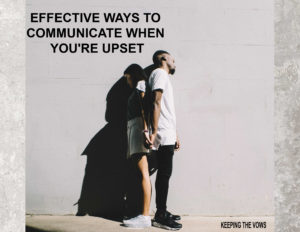Effective Ways to Communicate When You’re Upset

Question: What are some effective ways to communicate when you’re upset and not ready to talk about it yet (needing cool off time or time to understand your own feelings before talking about them)?
Great question. Who hasn’t had this experience, yet it can be difficult to address the issue. We love our spouse, but we feel like we just don’t want to talk about it right now. Here are some practical solutions for the issue.
The first thing to consider is that we have different ways to process things, including disagreements.
Different ways of processing a disagreement
Because opposites often attract, it is common that when disagreeing and things get heated, one person feels the need to settle it now and the other needs time to think it through. Most of the couples I work with see this in their relationship. One needs time to sort out feelings and maybe even think about what they will say. They don’t want to say the wrong or hurtful thing in the heat of the disagreement. The other can’t understand why this can’t be settled right now. Here’s where compromise is important. The person that has to talk it out can’t follow the other around the house and demand things get talked out right now. On the other hand, the person that needs to think about it can’t push off communicating about it forever. Here’s the compromise. Let’s say the couple has a disagreement in the morning before going to work. The one that needs time to think might say, “Hey babe, I know God put us together and I love you. Right now we aren’t getting along and communicating well. I need some time to pray and think about this. Let’s go to work and I promise when we get home I’ll be ready to talk about this.” This is good for several reasons. One, if the disagreement is heated, it gives time to cool down and reflect on the big picture. Two, by praying about it we allow God’s Spirit to bring unity to us.
By the way, the opposite of wanting to talk about it right away is peace at any price.
Peace at any price
Sometimes in a relationship one person just wants peace. The issue at hand is not as important as peace. Because of this they superficially give in so there is no disagreement. This may sound good but it will probably build up dissatisfaction over a period of time. It’s not uncommon for the pressure to build until this person eventually explodes. It’s much healthier to deal with things as they come along. The reason something is funny is that there is a grain of truth in the joke. On Home Improvement and Everybody Loves Raymond, both Tim and Ray have apologized to their wife, only to have the wife ask what they are sorry for. They get a glassy look in their eyes and they don’t know what they are sorry for, they just want peace – which lands them in bigger trouble yet! On this topic, comedian Jeff Foxworthy tells his wife, ‘I have no idea what I’ve done but I’d like to go to my room and think about it.’ It is funny because people can relate to this, either on one end of the issue or the other. In any event, peace at any price isn’t healthy.
Evaluate Yourself
Emotional intelligence (EQ) is understanding other people, but it is also understanding yourself. It is estimated that only about thirty percent of people understand their own emotions at any given time. When you get upset, stop to think about what mood you are in, what has been happening, and why you are feeling the way you are. This inward examination will possibly reveal the reason that you are disagreeable, therefore disagreeing, and it may have nothing to do with your spouse.
- When you get angry your ears close and your IQ drops by about half. You don’t enjoy communicating with a person like that and your spouse doesn’t either.
- Try using reflective listening and calmly say, “What I hear you saying is (and then repeat what you heard)”. Usually, if the person knows you are listening it helps.
- Don’t keep track
- Keep it current – it isn’t time for a history lesson, so don’t use the words “always” or “never”.
Winning and Losing
Kim and I are a committed team. We have decided to pull together, not apart. For this reason, we have discovered that when one of us wins an argument, we both lose. We don’t just give in to settle an argument, but we examine whether the argument is justifiable or seek to find a resolution that works for both of us.
Pray
Early in our marriage, we found that if we stop and pray for God’s Spirit to work in us that the argument subsides. We’ve already finished praying and found neither of us could remember what we had been arguing about.
Additional Articles that may help:
Safe Time
Crucifying Selfishness
Check out our YouTube video on this post.




